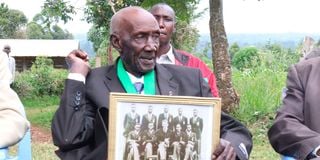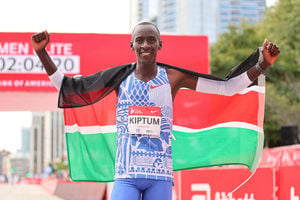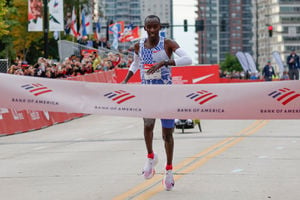
Joshua Barno, who was the commander of the first parade marking Kenya’s transition to a republic in 1964, holds a photo of athletes who participated in the Vancouver Commonwealth Games, Canada. He died last Thursday and will be buried on March 20.
Joshua Barno, the military man who was the parade commander when Kenya became a republic in 1964, and who raised its flag for the first time, died last Thursday at the age of 97.
At the time of his death, his dream of getting full recognition for his role and making Kenya, and Nandi County in particular, an athletics giant, were still work in progress.
Lt Col (Rtd) Barno died while receiving treatment at Moi Barracks, Eldoret, having gone largely unnoticed for his big role. He had risen through the ranks in pre-independence Kenya to lead the parade that first raised Kenya’s flag as the Union Jack came down.
“It was at midnight when Kenya became a republic. I cannot remember well the British soldier who lowered the British Union Jack, but I was the one raising Kenya’s flag at Lang’ata Barracks,” Barno said in an interview two years ago.
The Kenya Defence Forces (KDF), which had in February 2023 told Barno’s story, A Happy Veteran, says he led the first parade as commanding officer of the Nanyuki-based 1 Battalion, Kenya Rifles.
“On the spectacular December 1964 day in Kenya’s history, Lt Col (Rtd) Barno was the parade commander of the first parade marking Kenya as a Republic, a year after she gained independence on 1 June 1963. 1 KR received and trooped its Regimental and Presidential Colours, making it the first fully-fledged military establishment,” KDF describes the day, complete with pictures of military officers who had gone to visit Barno at his Nandi home.
"Barno was enlisted into the then King’s African Rifles in 1948 as a cadet and commissioned as a junior officer, before rising to head the military unit.
“Despite his advanced age, he could clearly recall when Kenya became a republic. How he raised the Kenyan flag at the Lang’ata Barracks while a British solider lowered the British Union Jack,” said Richard Biwott, the family spokesman.
It is Barno’s athletic prowess that saw him recruited into the army in 1948, and why he is now credited as the father of athletics in Nandi County.
Barno, who was from Kiptamu village in Kabirirsang location on the outskirts of Kapsabet town, represented the country in the first Commonwealth Games, then known as Empire Games, in 1954 in Vancouver, Canada.
“Among the races he participated was the 800 metre race in the Vancouver indoor games in which he came fourth. He also took part in the 100 yards, now 110 hurdles, during his active days as a sportsman,” Mr Biwott told the Nation in an interview.
Others who participated in the Vancouver games representing the Kenya British Protectorate include Nyandika Mayoro, Kiprugut Chumo, Charles Musendi, Maboria Tesut, Kiptalam Keter, Paul Boit, Joseph Lerasai and Lazarus Chepkwony, among others.
Barno’s Kabirirsang location is celebrated for having produced athletics world winners, including the legendary Kipchoge Keino, Henry Rono, Ben Kogo, Wilfred Bungei and Janneth Jepkosgei.
“It is unfortunate that most of these athletes, including my late father, were forgotten despite having brought glory to the country,” said Philemon Koros, one of Barno’s sons.
Hanging on the wall of Barno’s sitting room is a picture taken shortly after the athletics team landed in the country after the Vancouver games.
So how did Barno find himself in the military during the colonial rule and how did he rise so fast to command arguably the most important parade of his time?
“Just like any other minor among the Kalenjin, Mzee was tasked with the responsibility of herding family livestock after he completed his intermediate Class Four examination. What he told us is that he had no ambition of joining the military until he heard of a senior British soldier who was recruiting young people. He tried his luck and was picked to join the Kenya Africa Rifles,” recalled Mr Koros.
The British colonialists are believed to have targeted sportspersons to recruit them to the military where they underwent training before they were deployed to protect their interests.
They would undergo training in Lanet, Nakuru together with their colleagues from Tanzania, then Tanganyika, Uganda, Zimbabwe and South Sudan.
Barno had the advantage of being an elite athlete. He was appointed the commander of Kahawa Garrison in 1966 having led the first military unit under self-rule.
While in the military, Barno served alongside famous military officers such as Lucas Matu Mureithi, Jackson Mulinge and Peter Kakenyi. He retired honourably in 1967.
Unfortunately, very little has been told about them, save for Mulinge, who rose through the ranks to become the Kenya Army Commander, before rising to the highest post—Chief of General Staff, now Chief of Defence Forces—in 1978.
Mulinge was later elected Kathiani MP and also served in President Daniel Moi’s Cabinet.
Barno is said to have succumbed to health complications associated with aging while undergoing treatment.
“He was of good health after he retired from the military until 2021 when he suffered a mild stroke,” said Mr Koros.
The family has petitioned the government to facilitate a burial that befits a man who served his country well.
“Our father has done a lot for this country although his contribution was forgotten. It is however our appeal that the government accords a burial that befits him,” appealed Mr Koros.
He called on the military, led by Defence Cabinet Secretary Adan Duale, to intervene and assist in meeting burial expenses.
The family has set March 20 as the burial date.









